Reframe & Reset Your Career: Job Search & Career Development Insights
Struggling to land that big promotion or find that perfect new job? This is the podcast for you. If you want a career development and job search podcast, looking at strategies and practical steps to help you succeed, you’ve found it. You will learn from Recognised Experts and experienced professionals, who discuss their careers and the strategies which have helped them progress. Each episode covers topics including mindset, managing failure, resilience, leadership and communication. The podcast is hosted by Harsha Boralessa, which builds on his 15+ year career in the Big 4 accounting firms and Investment Banking.
Please subscribe or follow the podcast in your favourite App so you never miss a future episode.
Episodes
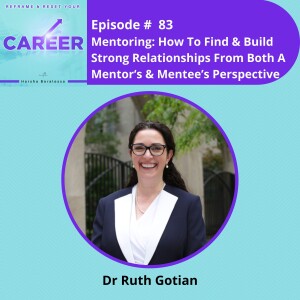
Wednesday Aug 28, 2024
Wednesday Aug 28, 2024
Looking for insights into finding, building and maintaining strong mentoring relationships from both a mentor’s and mentee’s perspective? I discussed this, her new book The Financial Times Guide to Mentoring and so much more with Dr Ruth Gotian on Episode 83 of the Reframe & Reset Your Career podcast.
In this episode, we will learn about:
What are the 4 key elements of success?
The importance of mindset to high achievement,
The benefits of mentoring for the mentee and mentor,
The differences between coaching, mentoring and sponsorship,
Strategies To Find A Mentor,
Developing a team of mentors including reverse mentors and peer to peer mentors,
What makes a good mentoring relationship?,
How to deal with a mentoring relationship which is not working, and
How Social Media including LinkedIn can boost your job search.
Ruth is the Chief Learning Officer, Associate Professor of Education in Anesthesiology and former Assistant Dean for Mentoring at Weill Cornell Medicine, is a globally recognized expert in mentorship and leadership development. Hailed by Nature, Wall Street Journal, and Columbia University as an expert in mentorship and leadership development, she was named a top 20 mentor worldwide.
Thinkers50 ranked her as the #1 emerging management thinker in the world in 2021, and LinkedIn recognized her as a top voice in mentoring in 2023. A semi-finalist for Forbes 50 Over 50, Ruth is a prolific contributor to Harvard Business Review, Forbes, and Psychology Today, where she shares insights on 'optimizing success.'
With a focus on the mindset and skill set of peak performers, including Nobel Prize winners, astronauts, Olympic and NBA champions, she's also an award-winning author of The Success Factor and The Financial Times Guide to Mentoring along with Andy Lopata.
People & Resources mentioned
Ann E. Dunwoody – A Higher Standard
Robert Lefkowitz – A Funny Thing Happened On The Way To Stockholm
Dr Robert Cialdini - Influence
Mentoring: A Complete Guide To Effective Mentoring - https://mentoring-guide.com/
Ruth’s Previous Interview (Episode 25) - https://harshaboralessa.podbean.com/e/episode-25-the-success-factor/
Contact Ruth
Website: www.ruthgotian.com
LinkedIn: https://www.linkedin.com/in/rgotian/
Twitter: https://twitter.com/ruthgotian
Instagram: https://www.instagram.com/ruthgotian/
Reframe & Reset Your Career Resources & Contact Info
Website: https://www.harshaboralessa.com/
YouTube Channel: https://www.youtube.com/c/ReframeResetYourCareer
LinkedIn Page: https://www.linkedin.com/company/reframe-reset-your-career/?viewAsMember=true
E-mail - reframeandresetyourcareer@harshaboralessa.com
Thank you for your continued support of Reframe & Reset Your Career, I do appreciate it. I now have a new website, see link above, please do check it out, I hope you find it helpful.
It would be great to hear from you, the listeners, and your thoughts about the podcast, YouTube channel or anything else, it's always a pleasure to hear your views. I have had some great reviews but not had any way of responding. I will be taking some time off from the podcast over the Summer and will only be releasing a new episode every 4 weeks. The next episode will be available on Weds 25th September. Hope you're having a great Summer!
*Reframe & Reset Your Career, including any comments made by the host and guests, is for informational purposes only and does not constitute advice of any description, including but not restricted to financial, legal, investing or medical advice.*
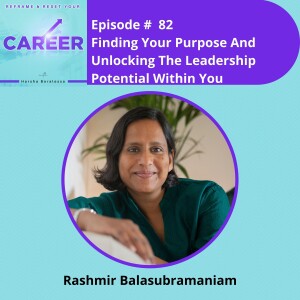
Wednesday Jul 31, 2024
Wednesday Jul 31, 2024
Looking for ideas and strategies to help you find your purpose and unlock the leadership potential within you? I discussed this and so much more with Rashmir Balasubramaniam on Episode 82 of the Reframe & Reset Your Career podcast.
In this episode, we will learn about:
Understanding what success means for you, don’t compare yourself to your peers,
Not being afraid to take risks and expand your comfort zone, especially if you’re risk averse,
Learning from “failure” and how this eventually led to her working at the Bill & Melinda Gates Foundation,
What is authentic leadership and why it matters?
We all have good ideas and the importance of partnering with the right people who will nurture them,
Reframing setbacks and focusing on the experience and knowledge that you have acquired,
Being aware of what type of leader you are and does it align with the current state of the organisation?,
Strategies to future proof you career and
Incorporating fun and enjoyment into your work.
Rashmir is a Transformational Leadership Coach and Strategic Thought Partner to founders, philanthropists and changemakers. She specializes in enlivening leaders and their teams, aligning their work with their unique purpose to unlock greater authenticity, impact, creativity and joy.Known for her ability to build trust and foster collaboration among diverse, multicultural, and multidisciplinary groups, Rashmir has held strategic and leadership roles across the social impact and private sectors. At the Bill & Melinda Gates Foundation, she led a study of market-based approaches across the Global Health and Global Development teams and brought a systemic approach to work on water and sanitation unlocking a major new funding for this sector. She has served as a trustee/NED to non-profits in the US and UK, and founded an innovative social enterprise to address the global nursing brain drain. Her experience includes 6 years in finance and investment banking and work across Africa, South Asia, the US, and the UK.Rashmir holds a Yale MBA and numerous qualifications in business, international development, and coaching. As a dedicated meditation and mindfulness practitioner, she integrates these practices into her coaching, helping clients achieve a contemplative edge that transforms their personal and professional lives.
People & Resources Mentioned
Gene Keys
Contact Rashmir
Website: https://rashmir.net/
LinkedIn: https://www.linkedin.com/in/rashmirbalasubramaniam/
YouTube: https://www.youtube.com/@rashmir
Reframe & Reset Your Career Resources & Contact Info
Website: https://www.harshaboralessa.com/
YouTube Channel: https://www.youtube.com/c/ReframeResetYourCareer
LinkedIn Page: https://www.linkedin.com/company/reframe-reset-your-career/?viewAsMember=true
E-mail - reframeandresetyourcareer@harshaboralessa.com
Thank you for your continued support of Reframe & Reset Your Career, I do appreciate it. I now have a new website, see link above, please do check it out, I hope you find it helpful.
It would be great to hear from you, the listeners, and your thoughts about the podcast, YouTube channel or anything else, it's always a pleasure to hear your views. I have had some great reviews but not had any way of responding. I will be taking some time off from the podcast over the Summer and will only be releasing a new episode every 4 weeks. The next episode will be available on Weds 28th August. Hope you're having a great Summer!
*Reframe & Reset Your Career, including any comments made by the host and guests, is for informational purposes only and does not constitute advice of any description, including but not restricted to financial, legal, investing or medical advice.*
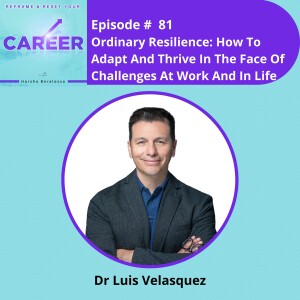
Wednesday Jul 03, 2024
Wednesday Jul 03, 2024
Looking to learn more about resilience and the strategies that can help you adapt and thrive when challenged at work and in life? I discussed this, his book Ordinary Resilience and so much more with Luis Velasquez, MBA, PhD. on Episode 81 of the Reframe & Reset Your Career podcast.
In this episode, we will learn about:
How Luis was inspired by his father who overcame a terrible accident to build a successful business,
Overcoming being diagnosed with a brain tumour which took away a successful career as an academic,
The importance of reframing difficult situations,
The three key drivers of resilience,
The five core pillars of resilience
Expanding your comfort zone,
Focusing on the potential benefits not the downside when faced with a challenging situation,
Being aware of the value that you are creating at work or in your business, and
Potential strategies for building resilience.
Luis is an executive coach in Silicon Valley and a facilitator for the Stanford Graduate School of Business. Once a university professor and research scientist, Luis helps mid-level managers to C-suite executives around the world learn, adapt, grow, and thrive by helping them learn how to reframe their challenges and take the most beneficial next step.
Luis is a contributor to Harvard Business Review and Fast Company and was featured in best-selling author Dorie Clark’s book, The Long Game. An avid endurance athlete, he runs marathons, ultra-marathons, and Ironman triathlons.
Drawing from his rich background and personal challenges, including recovering from a life-altering medical diagnosis, Luis brings a unique perspective to the discussion of leadership and resilience.
People & Resources Mentioned
Feel The Fear And Do It Anyway - Susan Jeffers
Plan B - Adam Grant
The Obstacle Is The Way – Ryan Holiday
The Leadership Challenge – Barry Posner & James M. Kouzes
Contact Luis
Website: https://www.velascoaching.com/
LinkedIn: https://www.linkedin.com/in/velasquezluis/
X (Twitter): https://x.com/Luis1_velasquez
Reframe & Reset Your Career Resources & Contact Info
Website: https://www.harshaboralessa.com/
YouTube Channel: https://www.youtube.com/c/ReframeResetYourCareer
LinkedIn Page: https://www.linkedin.com/company/reframe-reset-your-career/?viewAsMember=true
E-mail - reframeandresetyourcareer@harshaboralessa.com
Thank you for your continued support of Reframe & Reset Your Career, I do appreciate it. I now have a new website, see link above, please do check it out, I hope you find it helpful.
It would be great to hear from you, the listeners, and your thoughts about the podcast, YouTube channel or anything else, it's always a pleasure to hear your views. I have had some great reviews but not had any way of responding. I will be taking some time off from the podcast over the Summer and will only be releasing a new episode every 4 weeks. The next episode will be available on Weds 31st July. Hope you're having a great Summer!
*Reframe & Reset Your Career, including any comments made by the host and guests, is for informational purposes only and does not constitute advice of any description, including but not restricted to financial, legal, investing or medical advice.*
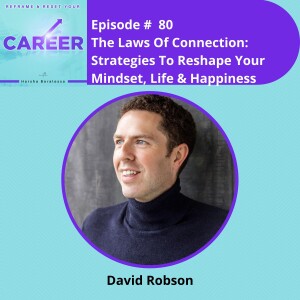
Wednesday Jun 05, 2024
Wednesday Jun 05, 2024
Looking for social strategies to help you build and maintain your relationships and connections? I discussed this, his latest book The Laws Of Connection and so much more with David Robson on Episode 80 of the Reframe & Reset Your Career podcast.
In this episode, we will learn about:
How understanding and overcoming the liking gap can help build new connections,
The impact of having an ambivalent connection/ frenemy,
Understanding which connections are healthy from those that are not,
Why benign envy can sometimes be helpful,
The importance of conversation, asking appropriate questions and actually listening,
How praise and appreciation of your colleagues can be valued by them like financial rewards,
Giving honest feedback and limiting “white lies”, and
How to promote yourself in a pleasant way and avoiding “humble bragging”.
David is an award-winning science journalist. His first book, The Intelligence Trap, has been translated into 15 languages and his second, The Expectation Effect, won the British Psychological Society Award. Previously an editor and senior journalist at BBC Future, Robson is now a freelance journalist; his writing has appeared in The Times, Telegraph, Guardian, Atlantic, Washington Post and more. He graduated with a degree in mathematics from Cambridge University.
People & Resources Mentioned
Rebecca West
Matt Haig – The Midnight Library
Contact David
Website: https://davidrobson.me/
LinkedIn: https://www.linkedin.com/in/david-robson-5761791b/
Twitter: https://twitter.com/d_a_robson
Reframe & Reset Your Career Resources & Contact Info
Website: https://www.harshaboralessa.com/
YouTube Channel: https://www.youtube.com/c/ReframeResetYourCareer
LinkedIn Page: https://www.linkedin.com/company/reframe-reset-your-career/?viewAsMember=true
E-mail - reframeandresetyourcareer@harshaboralessa.com
Thank you for your continued support of Reframe & Reset Your Career, I do appreciate it. I now have a new website, see link above, please do check it out, I hope you find it helpful.
It would be great to hear from you, the listeners, and your thoughts about the podcast, YouTube channel or anything else, it's always a pleasure to hear your views. I have had some great reviews but not had any way of responding. I will be taking some time off from the podcast over the Summer and will only be releasing a new episode every 4 weeks. The next episode will be available on Weds 3rd July. Have a great Summer!
*Reframe & Reset Your Career, including any comments made by the host and guests, is for informational purposes only and does not constitute advice of any description, including but not restricted to financial, legal, investing or medical advice.*
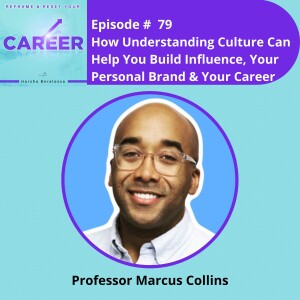
Wednesday May 22, 2024
Wednesday May 22, 2024
What is Culture and how can understanding it help you build influence, your personal brand and your career. I discussed this, his best-selling book For The Culture and so much more with Professor Marcus Collins on Episode 79 of the Reframe & Reset Your Career podcast.
In this episode, we will learn about:
How Marcus got his big break running digital strategy for Beyoncé,
How he learnt that facilitating an existing community is more powerful than building it from scratch,
What is culture and the three systems of culture?
What is a congregation and how it can help spread the message?
Differentiating products and services through the feelings they evoke rather than value and function,
Moving your target audience through emotion,
How brands like Patagonia and REI put their values into action even if it may potentially cost them financially,
Find the “true believers”, who love you and your product and focus on cultivating a connection with them,
Strategies for cutting through the noise and stand out from the crowd, and
Creating content consistently over time and not focusing simply on what is popular as you never know who is viewing your content.
Marcus believes there is no external force more influential to human behavior than culture. What we wear, what we eat, where we work, how we vote, and just about every facet of social living is informed by our cultural subscriptions. So he studies cultural contagion and how it manifests in our consumption proclivities, organizational dynamics, and society writ large. He leverages his scholarly work as a clinical professor at the Ross School of Business, University of Michigan, and the many years he spent in marketing as an advertising executive—most recently as the head of strategy at Wieden+Kennedy, New York—to bridge the academic-practitioner gap and use this knowledge to help people get people to take action.
Throughout his career, he has been acknowledged for his strategic, creative, and scholarly contributions (American Advertising Federation’s Advertising Hall of Achievement inductee, Thinkers50 Radar Distinguished Achievement Award, Cannes Lion Creative Strategy juror, Ad Age's 40 Under 40 recipient, and Crain’s Business 40 Under 40 recipient) as well as launched successful campaigns like “Cliff Paul” for State Farm, the Made In America Music Festival, and Google’s “Real Tone” technology—among others. Before his tenure in advertising, he worked in music and tech as a startup co-founder. Then he led iTunes + Nike sports music initiatives at Apple before running digital strategy for Beyoncé.
He is the author of the best-selling book, For The Culture, which examines the relationship between culture and human behavior. He has spent the last decade helping organizations—from Fortune 500 companies to startups and non-profits—use this knowledge to create culturally contagious ideas that get people to move. The book aims to do the same for readers.
He is a graduate of Temple University (DBA) and the University of Michigan (BSE in Materials Science Engineering and MBA with an emphasis in strategic brand marketing).
People & Resources Mentioned
The Alchemist – Paolo Coelho
Emile Durkheim
Raymond Williams
Brené Brown
Charles “C.C.” Chapman
Contact Marcus
Website: https://marctothec.com/
LinkedIn: https://www.linkedin.com/in/marctothec/
Reframe & Reset Your Career Resources & Contact Info
Website: https://www.harshaboralessa.com/
YouTube Channel: https://www.youtube.com/c/ReframeResetYourCareer
LinkedIn Page: https://www.linkedin.com/company/reframe-reset-your-career/?viewAsMember=true
E-mail - reframeandresetyourcareer@harshaboralessa.com
Thank you for your continued support of Reframe & Reset Your Career, I do appreciate it. I now have a new website, see link above, please do check it out, I hope you find it helpful.
It would be great to hear from you, the listeners, and your thoughts about the podcast, YouTube channel or anything else, it's always a pleasure to hear your views. I have had some great reviews but not had any way of responding. The next episode will be available on Weds 5th June with David Robson, the award-winning author of The Intelligence Trap, The Expectation Effect and his latest book The Laws of Connection.
*Reframe & Reset Your Career, including any comments made by the host and guests, is for informational purposes only and does not constitute advice of any description, including but not restricted to financial, legal, investing or medical advice.*
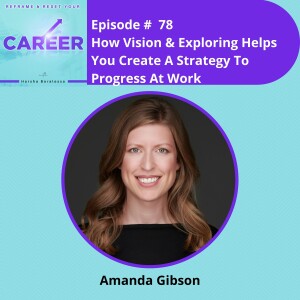
Wednesday May 08, 2024
Wednesday May 08, 2024
Looking to understand how having vision and curiosity can help you create a strategy to progress at work and thrive in your career. I discussed this and so much more with Amanda Gibson on Episode 78 of the Reframe & Reset Your Career podcast.
In this episode, we will learn about:
Building your personal brand,
What is strategy?
Why is vision so important?,
How testing and making small experiments can provide powerful insights and information to guide you,
The power of building a following and a community,
How strategy can be applied to your career,
The value of exploring problems with friends and trusted colleagues, who can provide support and a different perspective,
Why it’s important to be aware of the value you create,
Strategies to help you pivot and transition in your career, and
The value of sitting with uncertainty and being adaptable.
Amanda is an organizational designer, growth strategist, leadership advisor, and executive coach. She helps senior leaders and organizations tackle their most complex challenges and accelerate success - particularly in times of significant change – so that they can deliver on their most critical growth, stakeholder, and leadership initiatives without burning people out in the process.
Her approach uses strategy, organizational design, and stakeholder engagement as the threads that weave together purpose, vision, people, and results.
This stems from 20 years of working with organizations as they adapt and expand into new capabilities and new markets, and combines with an educational background that includes a Global MBA from Thunderbird School of Global Management, a Master’s in Organizational Psychology, degrees in Finance and Spanish, and several innovation, leadership, coaching, and assessment certifications.
Prior to starting her own practice, Amanda led change and people initiatives across various industries and business functions, as well as multimillion-dollar strategy and innovation efforts inside a multibillion-dollar corporation. Over the years, she has worked with everyone from small founder teams to companies of all sizes and forms in over 50 countries.
Amanda has been featured in publications like Fast Company, and some of her best work is done on a trail, in the garden, or by the ocean.
People & Resources Mentioned
Kintsugi
Taylor Swift
Contact Amanda
Website: https://amandagibson.com/
LinkedIn: https://www.linkedin.com/in/1amandagibson/
Reframe & Reset Your Career Resources & Contact Info
Website: https://www.harshaboralessa.com/
YouTube Channel: https://www.youtube.com/c/ReframeResetYourCareer
LinkedIn Page: https://www.linkedin.com/company/reframe-reset-your-career/?viewAsMember=true
E-mail - reframeandresetyourcareer@harshaboralessa.com
Thank you for your continued support of Reframe & Reset Your Career, I do appreciate it. I now have a new website, see link above, please do check it out, I hope you find it helpful.
It would be great to hear from you, the listeners, and your thoughts about the podcast, YouTube channel or anything else, it's always a pleasure to hear your views. I have had some great reviews but not had any way of responding. The next episode will be available on Weds 22nd May with Professor Marcus Collins.
*Reframe & Reset Your Career, including any comments made by the host and guests, is for informational purposes only and does not constitute advice of any description, including but not restricted to financial, legal, investing or medical advice.*
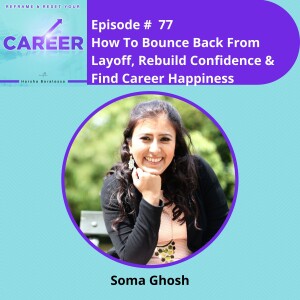
Wednesday Apr 24, 2024
Wednesday Apr 24, 2024
Looking for ideas to help you bounce back from layoff, rebuild your confidence and find career happiness? I discussed this and so much more with Soma Ghosh, award winning career coach of The Career Happiness Mentor and host of The Career Happiness podcast, on Episode 77 of the Reframe & Reset Your Career podcast.
In this episode, we will learn about:
Ideas for building confidence,
Practical steps to manage and bounce back from lay off,
The importance of self care,
Not being afraid to leave a job but taking time to think through your options and create a plan,
Strategies to help prepare for an interview,
How to manage a difficult boss and a challenging working environment and
Making a career pivot.
Soma is a careers adviser who has previously worked in education and helping young people with career advice and job hunting. She has a PGdip in Careers guidance as well as and degree in Psychology and Criminology.
Soma runs her own career mentoring business where she helps ambitious women find their dream job and career and understand what their idea of career happiness is.
Soma has written for Thrive Global and Happiful magazine. As well as hosting her own podcast “The Career Happiness podcast” since 2019.
Soma has been featured in BBC work life, Yahoo Finance, Stylist magazine, All Bright collective, Asian voice, Metro and has spoken about peer pressure in linking with careers on BBC Asian network.
Soma talks about women who are going through anxiety at work, workplace bullying, confidence, and the importance of wellbeing at work. As well as career change and how to build a portfolio career.
People & Resources Mentioned
Susan Cain – Quiet
Office Space
Contact Soma
Website: https://www.somaghosh.com/
LinkedIn: https://www.linkedin.com/in/soma-ghosh-26086638/
Instagram: https://www.instagram.com/the_careerhappinessmentor/
Twitter: https://twitter.com/sgcareers27
Reframe & Reset Your Career Resources & Contact Info
Website: https://www.harshaboralessa.com/
YouTube Channel: https://www.youtube.com/c/ReframeResetYourCareer
LinkedIn Page: https://www.linkedin.com/company/reframe-reset-your-career/?viewAsMember=true
E-mail - reframeandresetyourcareer@harshaboralessa.com
Thank you for your continued support of Reframe & Reset Your Career, I do appreciate it. I now have a new website, see link above, please do check it out, I hope you find it helpful.
It would be great to hear from you, the listeners, and your thoughts about the podcast, YouTube channel or anything else, it's always a pleasure to hear your views. I have had some great reviews but not had any way of responding. The next episode will be available on Weds 8th May with Amanda Gibson.
*Reframe & Reset Your Career, including any comments made by the host and guests, is for informational purposes only and does not constitute advice of any description, including but not restricted to financial, legal, investing or medical advice.*
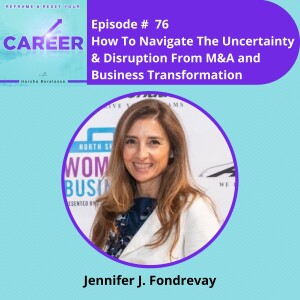
Wednesday Apr 10, 2024
Wednesday Apr 10, 2024
In this episode, we will learn about potential strategies for navigating the uncertainty, disruption and fear that comes from mergers, acquisitions and other business transformation. I discussed this and so much more with Jennifer J. Fondrevay, the founder of Day1 Ready™ and author of "Now What? A Survivor’s Guide for Thriving Through Mergers and Acquisitions", on Episode 76 of the Reframe & Reset Your Career podcast.
In this episode, we will learn about:
Pivoting from her initial dream to be the US Ambassador to France to a career in advertising and marketing,
Building your personal brand and digital footprint with marketing principles,
Being thoughtful about your appearance and respecting your audience whether at interview or presenting,
Strengthening connections through finding commonalities,
The lessons she learnt that helped her become a better leader,
Her TEDx talk and focusing on the things we can control such as Talent, Effort & Attitude (TEA),
The power of story telling,
Managing the uncertainty and disruption arising from M&A and business transformation,
Understanding the value you bring to any potential employer, and
Don’t be afraid to move jobs if things are not working out but have a strategy to help you navigate the transition.
Jennifer is the Founder of Day1 Ready™, a consultancy that advises forward-thinking business leaders, owners, and C-Suite executives on how to prepare for the human capital challenges of M&A. As a Fortune 500 C-Suite “survivor” of three multibillion-dollar acquisitions, Jennifer has been on all sides of the deal equation. She saw countless growth strategies fail due to a workforce that couldn’t pivot and adapt as quickly as leadership anticipated.When her Harvard Business Review (HBR) article “After a Merger, Don’t Let “Us vs. Them” Thinking Ruin the Company” went viral, Jennifer recognized the power and interest in a human-centric approach to business transformation, where employees are at the heart of the change. She shares her expertise as a contributor to: Forbes, Harvard Business Review, Thrive Global, American Marketing Association, Middle Market Growth; and as a frequent podcast guest and keynote speaker for HR conferences, associations, and Fortune 500 companies.
Jennifer and I talked about how you can turn things round if you encounter difficulties when leading a new team. She told me "What they wanted to know is how was I going to help them in the present moment, right? They hadn't had a leader in a year and … I worked that much harder to see how can I help this team? What value do I bring to this team? It's not about what I've done in the past, but it's what I can do now to help them in the future, moving forward. It made me work so much harder … it was about what I could do to contribute to their future."
People & Resources Mentioned
Dorie Clark – The Long Game
Dr Robert Ciadini - Influence
Jennifer’s TEDx talk: https://www.youtube.com/watch?v=NQpOCeKI3oE
Dr Ellen Taafe
Dr Gena Cox - Leading Inclusion
Contact Jennifer
Website: https://jenniferjfondrevay.com/
LinkedIn: https://www.linkedin.com/in/jennifer-fondrevay/
YouTube: https://www.youtube.com/@jenniferj.fondrevay2463
Reframe & Reset Your Career Resources & Contact Info
Website: https://www.harshaboralessa.com/
YouTube Channel: https://www.youtube.com/c/ReframeResetYourCareer
LinkedIn Page: https://www.linkedin.com/company/reframe-reset-your-career/?viewAsMember=true
E-mail - reframeandresetyourcareer@harshaboralessa.com
Thank you for your continued support of Reframe & Reset Your Career, I do appreciate it. I now have a new website, see link above, please do check it out, I hope you find it helpful.
It would be great to hear from you, the listeners, and your thoughts about the podcast, YouTube channel or anything else, it's always a pleasure to hear your views. I have had some great reviews but not had any way of responding. The next episode will be available on Weds 24th April with Soma Ghosh, the Founder of The Career Happiness Mentor and host of The Career Happiness podcast.
*Reframe & Reset Your Career, including any comments made by the host and guests, is for informational purposes only and does not constitute advice of any description, including but not restricted to financial, legal, investing or medical advice.*
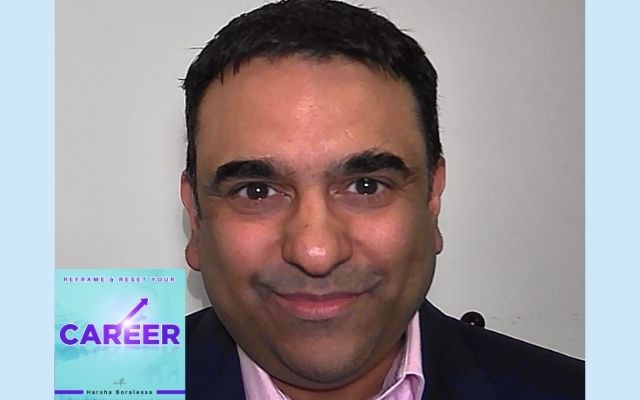
Reframe & Reset Your Career
Reframe & Reset Your Career is a podcast and YouTube Channel created by Harsha Boralessa, which came from his passion for neuroscience and psychology. The podcast was listed by Feedspost at #36 in the Best 60 Career Podcasts and #8 in the Best 20 UK Career Podcasts.
The podcast's aim is to empower individuals to take greater control of their career development and approach it in a more strategic manner through the strategies and insights used by successful professionals and Recognised Experts to help their careers thrive.
Harsha is a CFA charterholder, chartered accountant and graduate of the London School of Economics. He has worked for over 15 years in front office and advisory roles in investment banking, investment management and "big 4" accounting firms. He is also developing a personal development App with a neuroscience and psychology influence.
Reframe & Reset Your Career, including any comments made by the host and guests, is for informational purposes only and does not constitute advice of any description, including but not restricted to financial, legal, investing or medical advice.




